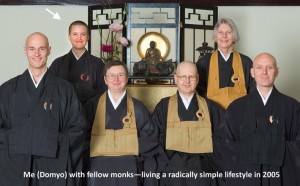 Okay, let me be clear up front: I’m not saying it’s good to ignore global warming! I am trying to point out that not all our reasons for ignoring it are selfish, lazy, or stupid.
Okay, let me be clear up front: I’m not saying it’s good to ignore global warming! I am trying to point out that not all our reasons for ignoring it are selfish, lazy, or stupid.
I’ve been thinking about this since my post Can We Really Save the World with Lifestyle Change? A Buddhist acquaintance of mine, Satya Vayu, left a long comment on that post expressing many things with which I agree. In fact, he expressed my views pretty perfectly, pointing out that governments and corporations are invested in seeing us continue our consumerist lifestyles and that,”Changing our way of life radically (in the original sense – fundamentally, from the root) is a necessity, not one strategy of addressing the situation.”
Satya also appeals to me as a Buddhist teacher, writing: “I was a little surprised to find convenience and comfort equated with enjoying one’s life in one sentence in your post, although I know that’s certainly the dominant story we’re taught in our consumerist society. I think it would be very helpful if those of us who take on full-time spiritual practice as our public life (especially in the Buddhist tradition) would teach a different story. One where a truly joyful and fulfilling life could be had with dramatically less material needs – instead relying on the nurturing support of our contemplative practices, access to a healthy natural environment, and, perhaps most crucial of all, a sharing and supportive community (sangha). We should remember that the Buddha voluntarily gave up his own life of material privilege and instead relied on just these supportive elements. We will not all give up our material privilege to the same extent and in the same way, but we would do well to keep the necessity of that direction in mind, and be in touch with the potential reality of it’s expression.”
I agree with Satya and love the ideas he presents, but here’s the rub: Satya lives according to these values and I don’t. As you might recall, according to the latest calculations, if everyone on earth lived like I do, it would take four planet earths to sustain us. In comparison, at least last I heard, Satya lives more or less as a modern-day mendicant monk. He stays wherever someone is willing to host him, offering his Buddhist teaching to those who seek him out wherever he is. He owns almost nothing and lives on offerings – some of them, I suspect, recovered from dumpsters. It’s been ten years since he used a car and fourteen since he traveled by plane.
People like Satya send the rest of us an incredibly important message: it is entirely possible to be happy without all our stuff. In fact, most people who have actively embraced radical simplicity claim that they are much happier living that way than they were before. It reminds me of Theravadin monks who own nothing but their robes and bowls, and eat only what devotees put in their bowls once a day. It’s difficult to find more radiantly happy people.
So… why don’t I start shedding my stuff and embrace the joy of simplicity? Why is the biggest lifestyle change I’ve made – since my journey of conscience began in August – buying biodegradable trash bags? (A change which, I’ll have you know, requires me to carry the whole garbage can down three flights of stairs and out to the trash bins behind my building, where I have to shake it directly from the can; biodegradable bags are essentially just can liners and aren’t strong enough to hold a load of trash by themselves.)
I’ll ‘fess up to selfish, lazy, and stupid reasons first. I like my life. It’s comfortable. I like going out to eat and watching movies while drinking gin-and-tonics. It would take lots of work, time, money, and energy to responsibly divest myself of my habits and stuff and embrace a lifestyle the earth can sustain. I’m busy and hope the world will work things out before I have to take more personal responsibility. I feel unwilling to sacrifice when most people are going to continue to consume as much as they can get their hands on.
However, there is a much more substantial and important reason I remain so attached to my lifestyle: I value my relationships.
I’m not saying people like Satya don’t value their relationships, but generally speaking they have had to radically alter their relationships along with the rest of their lifestyle.
I have a relationship with my husband. I not blaming him for my failure to radically simplify, but there’s two of us involved in our choices about housing, eating habits, car ownership, and other matters. If I spend an extra five hours a week commuting by mass transit, that’s five fewer hours a week I spend with him. He provides most of our income, so I don’t feel like I can insist he eat my mediocre cooking every day instead of enjoying restaurant meals several times a week. Besides, we have most of our conversations over our dinners out.
I have a relationship with my parents, sister, niece, nephew, and extended family, all of whom reside over 1500 miles away from me in Minnesota. I see them once or twice a year at the most, which is barely enough to maintain a connection. As long as the means are available, I won’t stop visiting them.
I have a relationship with my pets. They require all kinds of extra resources and time, but they are one of the greatest joys in my life.
I have a relationship with my Zen sangha. I chose to locate my Zen center in a suburb 10 miles away from where I live so people in that area wouldn’t have to commute to my side of town, where all the Buddhist practice places are. This means I commute there. If I were to commute by mass transit, conduct careful research into everything I buy, cook most of my meals, tend a garden, and travel by Amtrak, I would have substantially less time to devote to supporting my sangha in terms of practice time, teaching prep, and administration.
Perhaps most profoundly, I have a relationship with my society. Its problems and flaws are too numerous to count, but I belong to it. My neighbors and friends and family members belong to it. Each radical choice I make potentially creates distance between me and the people around me. When I am a vegetarian or vegan, when I won’t wear leather or buy the kinds of products they buy, when I won’t drink alcohol, when I forgo the travel methods they use, when I won’t accept their gifts, when I opt out of watching their movies and TV shows, when I have nothing to talk to them about because my lifestyle is so different from theirs… I may impress or inspire them, but I am just as likely to alienate them.
I used to think the sense of alienation or distance people experience when they encounter someone living a radically different lifestyle was their own damn problem and they should just get over it. After all, social change never happens if individuals don’t take the risk of sticking out like sore thumbs once in a while. What matters more anyway – the truth, or someone’s feelings? Isn’t it my duty to refuse my grandmother’s pot-roast even though she finds it hard to conceive of a what a vegetarian is?
I know what I’m talking about here because I lived a radically different lifestyle from my society for ten years. I was bald, wore a Zen uniform so I didn’t own any normal clothes or have any style of my own, and lived in a communal setting where we shared all of our meals and had little privacy. For a long time I didn’t drink any alcohol or consume any media. I owned and lived on next to nothing so my life was extremely simple. Unless you were willing to listen to me talk about week-long meditation retreats and the struggle to realize emptiness, I was probably pretty boring to be around.
Living this simple lifestyle was great. I enjoyed it and don’t have any regrets. In some ways I’d like to return to it. But I was opting out of my society’s culture and lifestyle for the most part. Sure, I could still have a deep spiritual moment with someone who spent lots of time at the mall. My example reminded the people around me of alternative ways to live. I wasn’t separate from anything that really matters. Still…
Last night I had a wonderful moment of feeling great connection and joy with my society. I was at a big classical/bluegrass Christmas concert in downtown Portland with about 2,500 other people. We were not a diverse crowd, and we had no great aspirations. We simply shared a sense of deep, unspeakable familiarity with and love for Christmas carols, good music, and the joy of being with family and friends during the holiday season. We shared a longing to celebrate our lives, appreciate traditions, and be happy. As usual, the more beautiful moments of music made tears flow out of my eyes.
This simple happiness felt like such a contrast to the pervasive sense of guilt and worry that issues like global warming bring up in me. It felt strangely reassuring to imagine human beings continuing to celebrate this way, even if the world goes to hell in a hand-basket.
We’re all in this together. How do we best embrace the necessary changes without creating too much distance in our relationships? Can we all embrace more simplicity, not in order to meet some ideal but in order to support those who are already doing so? Can we create change while maintaining our connection to one another? I hope so, because my heart bleeds for our planet but I’m also not jumping off the ship of my society even if it’s sinking.












